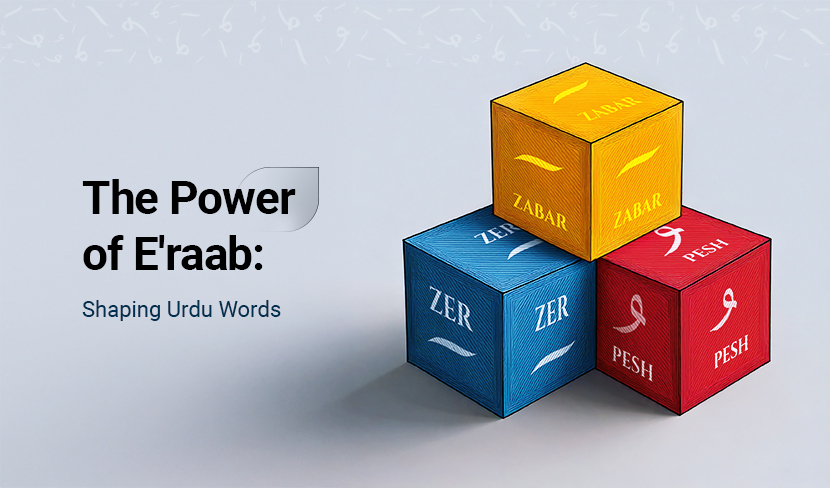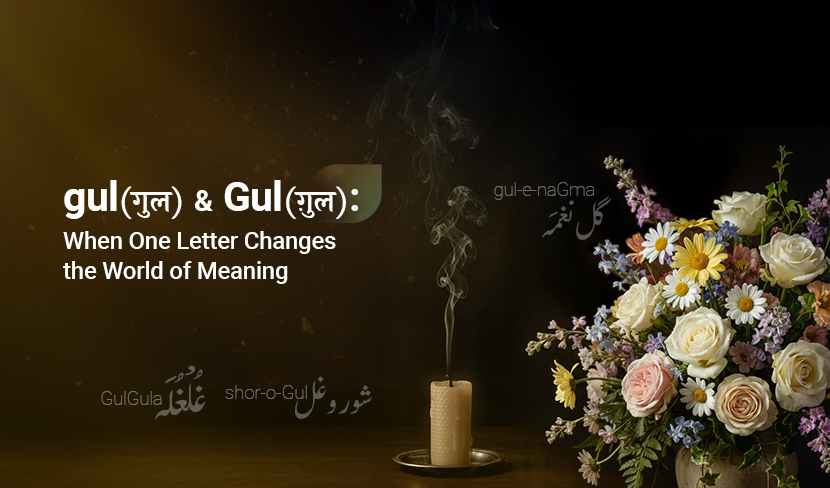زیادہ تلاش کیے گئے الفاظ
محفوظ شدہ الفاظ
کِھسیانی بِلّی کَھمبا نوچے
جسے غصہ آرہا ہو وہ دوسروں پر اپنی جھلاہٹ اتارتا ہے، بے بسی میں آدمی دوسروں پر غصہ اتارتا ہے، شرمندہ شخص دوسروں پر اپنی شرمندگی اتارتا ہے، کمزور کی جھنجھلاہٹ
چَمَنِسْتان
ایسا باغ جہاں پھول کثرت سے ہوں، ایسی جگہ جہاں دور تک پھول ہی پھول اور سبزہ سبزہ نظر آئے، گلزار، گلستان، باغ، پھولوں کا قطعہ، سبز کھیت
Beyond the Letter: Harf in Urdu

At first glance, the word harf (حرف) in Urdu seems simple. It means a single letter of the alphabet. Its plural, hurūf (حروف), comes up in phrases like hurūf-e-tahajjī (حروفِ تہجی) — the alphabet we all learned as children. In grammar, a harf (حرف) can also be a particle: those tiny but important joining words such as prepositions or conjunctions.
But this is Urdu, and nothing stays that straightforward. harf (حرف) stretches into meanings far beyond letters. It can mean a word, a statement, or even speech itself. And when it teams up with other words, it blossoms into a whole garden of expressions.
Harf in Expressions
Take a few favorites:
• Harf-e-tamannā (حرفِ تمنا): a word of longing or desire
• Harf-e-ākhir (حرف آخر): the final word, the last decision
• Harf-e-mukarrar (حرفِ مکرر): a repeated letter, or something said again
Ghalib gave harf-e-mukarrar (حرفِ مکرر) an unforgettable twist:
یارب زمانہ مجھ کو مٹاتا ہے کس لیے
لوح جہاں پہ حرف مکرر نہیں ہوں میں
O Lord, why does the world try to erase me?
I am not a repeated letter on the tablet of existence.
And if you’ve ever been to a mushā‘ira (a poetry recitation gathering), you’ve probably heard the audience call out:
“Mukarrar irshād!” — please repeat that verse again!
When Harf Turns into Idiom
In idioms, harf (حرف) mirrors real life:
• harf ānā (حرف آنا): to face blame or disgrace.
A poet once put it beautifully:
گھر کی جب بات نکل جاتی ہے گھر سے باہر
در پہ حرف آتا ہے دیوار پہ حرف آتا ہے
(When family secrets come out, reproach falls on both the doorstep and the walls.)
• harfon kā banā honā (حرفوں کا بنا ہونا): to be clever, sly, or just too talkative
• tīn harf bhejnā (تین حرف بھیجنا): to curse or condemn someone
In these turns of phrase, harf (حرف) is no longer just a letter — it’s emotion, accusation, wit, and even anger.
Words Born from Harf
The word also gave rise to others we use often:
• hirfat (حرفت): a trade, craft, or profession
• inhirāf (انحراف): deviation, rebellion, going off the straight path
From Arabic Roots to Urdu Creativity
The Arabic root of ḥarf (حرف) means “to bend or turn.” A letter isn’t a rigid line — it curves, flows, leans — and that sense of movement gave the word its name.
When it traveled into Urdu, the word gathered new shades. Consider haraafa (حرافہ).
In Arabic and Persian, harāf (حراف) meant a witty, lively speaker. But in Urdu, it shifted: now it described someone sharp-tongued, crafty, even cunning. In old Delhi and Lucknow, elderly women often used ḥarāfa (حرافہ) for women who were too talkative, too shrewd, or too free-spirited. Interestingly, Persians stopped using the word — but in Urdu, it stayed.
Poetry, however, softened it:
دل فریبی کا نہیں کون سا انداز آتا
چھوڑتا جان کو عاشق کی وہ حراف نہیں
The beloved knows every art of enchantment,
Yet never lets the lover escape their hold.
Why Harf Still Matters
It’s astonishing how a small three-letter word from Arabic grew into such a vast world in Urdu. From the alphabet we learn as children, to idioms that capture our joys and sorrows, to poetry, professions, and philosophies — harf (حرف) has touched them all.
Delete 44 saved words?
کیا آپ واقعی ان اندراجات کو حذف کر رہے ہیں؟ انہیں واپس لانا ناممکن ہوگا۔






